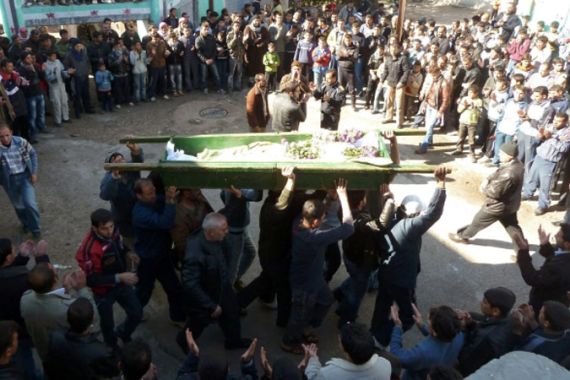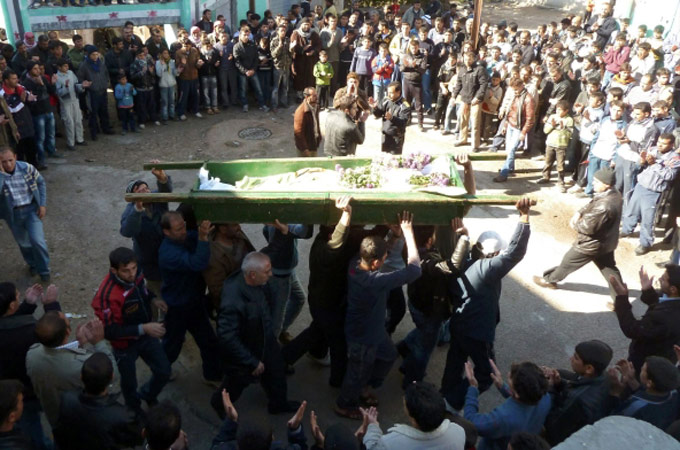UN official: Syria death toll data reliable
Middle East human rights chief tells Al Jazeera that UN’s estimate that 5,000 people have died in Syria is credible.

 |
|
Some Syrian activists claim that the UN figure is an underestimation and more than 8,000 people were killed [Reuters] |
The United Nations says that more than 5,000 people are believed to have been killed in the Syrian government’s crackdown on protests since the country’s uprising began in March.
Navi Pillay, the UN human rights chief, said on Monday that at least 300 children were among the dead.
But Bashar Jaafari, Syria’s UN ambassador, said the UN briefing was part of a “huge conspiracy concocted against Syria since the beginning” and added that Pillay was neither objective nor fair.
“She is not genuine in all her approach, in the report she presented… She has trespassed her mandate, she allowed herself to be misused in misleading the public opinion by providing information based on allegations collected from 233 defectors,” Jaafari said.
“How could defectors give positive testimonies on the Syrian government? Of course they will give negative testimonies against the Syrian government. They are defectors.”
Many Syrian activists, meanwhile, believe that the latest UN figure is an underestimation of the reality on the ground, with some claiming that more than 8,000 people were killed across the country.
Al Jazeera speaks to Frej Fenniche, chief of Middle East and North Africa section of the UN Human Rights Council, to discuss the credibility of his organisation’s figures.
Q: The government has said your report is not reliable. What do you think about that?
Every time we mention a number or any violation in Syria, the Syrian government will say the same: It’s not true and the sources are not reliable.
When the demonstrations started in March, we mentioned 300 victims of the violence and they said the same. So we asked for access. It has been eight months now and there is still no authorisation from the Syrian government to [allow the access to] the Commission of Inquiry, to the Office of Higher Commissioner for Human Rights, to the media, to NGOs …
This is the problem. Syria has to open the doors to human rights observers, Amnesty International and others, and the Commission of Inquiry to get into the country. They do not even allow observers from the Arab League to enter the country.
Q: The UN said the report and the death toll are based on “reliable sources”. What does reliable sources mean?
We have many contacts inside the country and outside. We received a lot of information from eyewitnesses, from many defectors in the army, from hospitals… We are in contact with people on the ground. At this time, we cannot give names of our contacts. We have contacts with many people in villages, including in Homs. We receive information, we verify them, we check our information, and then we put it in our reports.
Q: How do you verify information?
We have our own methodology to verify. The Office for Higher Commissioner for Human Rights is not a new organisation. This is our work. This is what we have been doing for more than 20 years. Believe me we are conducting very carefully our investigation and we verify everything.
|
“But if the government is saying that we are lying we can say: OK let [us] go into the country and we will see” – Frej Fenniche, UNHRC |
The Higher Commissioner for Human Rights [Navi Pillay] is a judge; she is not somebody who will campaign against any country. She is doing her work and this is her mandate. At this stage we cannot reveal the name of the contacts or the sources.
But if the government is saying that we are lying we can say: “OK let [us] go into the country and we will see.”
[Deposed Iraqi President] Saddam Hussein refused [to grant us] access to Iraq. We produced many reports to the Security Council and to the General Assembly. And at the end, everybody discovered the situation.
Even the Syrian state TV talks about numbers of victims. It said 1,100 people from the police, security forces and the army were killed. And this official number was in June.
So there is a problem. The Syrian government is saying there is nothing happening in Syria.
Q: You said some of the witnesses the UN spoke with are defectors. But Syria’s ambassador to the UN said army defectors only say negative things about the government. Did you speak with Syrian officials or regular army soldiers before releasing the report?
Who said to Mr. Jaafari that we are not in contact with people within the army now and with people at the high level within the government?
We have also contacts with officials on the basis of confidentiality. This is the confidentiality of sources. We receive information, we receive pictures and we receive testimonies from the families from the hospital from doctors from NGOs, and from journalists inside the system.
Q: The government says that there are “terrorists” shooting at regular army soldiers. Did you in your research discover whether this is true or not?
We heard some allegations about that. But for us to support the government in its position, they have to co-operate with the UN.
The same argument was used at the time of apartheid in South Africa, in Iraq and in Libya recently. They all say the same: “These are terrorists” etc. But what about civilian victims?
Q: Has the UN not been able to verify if there are “terrorists” or not given that you have sources on the ground?
We cannot at this time qualify these people as terrorists. But we can say that many officials from the army and security forces were killed. This is true. This is a reality.
Q: There are discrepancies between your figures and some other activists groups in Syria. Why is that so?
This is a point that should be taken into consideration in order to understand our position as the UN.
We are not replicating the same [figures]. We do not repeat what we receive from the internet. We verify whatever we receive from any committee or NGOs. We check the name, the region, the village, the age, etc. We really try to be careful about any declarations we make.
Q: Do you have a list of the names of confirmed victims?
We have a list and we can share it with the government if it allows [in] our investigators, or Arab League monitors, or the Commission of Inquiry, or the media, or any other credible institution. If it turns out we are wrong, we will apologise for that.
We cannot put it in a report because 5,000 names is too much.
Q: The UN seems hesitant about characterising the situation in Syria as civil war. What would it take for the situation in Syria to be characterised as a civil war?
We cannot characterise it as a civil war. It is not a question of numbers of dead. It is a question of confrontations on the ground. You have some soldiers defecting from the army and trying to do something. But the UN does not want violence in Syria and it is the responsibility of the government to stop attacks against civilians.
Follow Basma Atassi on Twitter: @Basma_